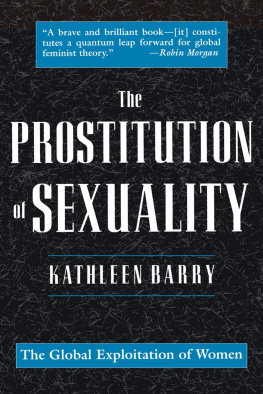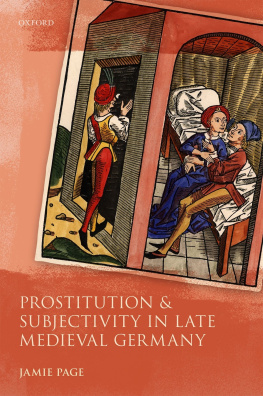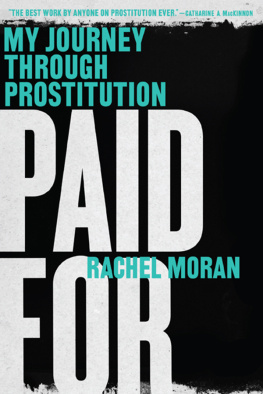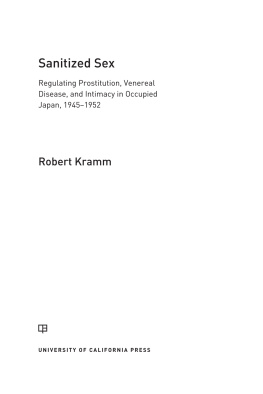2015 by the Board of Trustees
of the University of Illinois
All rights reserved
Manufactured in the United States of America
1 2 3 4 5 C P 5 4 3 2 1

This book is printed on acid-free paper.
Library of Congress Cataloging-in-Publication Data
Aderinto, Saheed, author.
When sex threatened the state: illicit sexuality, nationalism, and politics in colonial Nigeria, 19001958 / Saheed Aderinto.
pages cm
Includes bibliographical references and index.
ISBN 978-0-252-03888-4 (cloth : alk. paper)
ISBN 978-0-252-08042-5 (pbk. : alk. paper)
ISBN 978-0-252-09684-6 (ebook)
1. SexPolitical aspectsNigeriaHistory20th century. 2. SexSocial aspectsNigeriaHistory20th century. 3. ProstitutionNigeriaHistory20th century. 4. Child prostitutionNigeriaHistory20th century. 5. ProstitutionLaw and legislationNigeria. 6. Sexually transmitted diseasesNigeriaHistory20th century. 7. Sexually transmitted diseasesGreat BritainColonies. 8. Great BritainColoniesAfricaSocial policy. 9. NigeriaSocial policy20th century. 10. NigeriaPolitics and governmentTo 1960.
I. Title.
HQ18.N55A33 2014
306.740966909'04dc23 2014016324
CONTENTS
Chapter 1.This Is a City of Bubbles:
Lagos and the Phenomenon of Colonial Urbanism
Chapter 2.The Vulgar and Obscene Language:
Prostitution, Criminality, and Immorality
Chapter 3.Childhood Innocence, Adult Criminality:
Child Prostitution and Moral Anxiety
Chapter 4.The Sexual Scourge of Imperial Order:
Race, the Medicalization of Sex, and Colonial Security
Chapter 5.Sexualized Laws, Criminalized Bodies:
Anti-prostitution Law and the Making of a New Socio-Sexual Order
ACKNOWLEDGMENTS
This book could not have been written without the generosity and assistance of many institutions, agencies, and individuals. My indebtedness goes to the staff of the three main Nigerian National Archives for helping to comb the repositories to pull out several rare documents that helped me write this book. I also thank Rasheed Hassan and Oyinkansola Ilori for their help in the archives. My numerous informants were not just a source of oral information about Lagoss past. They were true collaborators in my quest to understand the complex, yet fascinating history of twentieth-century Lagos. I thank them for enduring my often difficult questions about sexuality, and for allowing me to probe their memory for events that lay deep in the ocean of the past.
The feedback I received on various portions of this book at meetings, conferences, and symposia contributed immensely to shaping my thoughts. My heartfelt gratitude goes to Funso Afolayan and Gloria Chuku for their comments on versions of were presented at the 14th Annual Emerging Scholarship in Womens and Gender Studies Conference and the Gender Symposium organized on the campus of University of Texas in 2007 and 2009, respectively. I thank all the participants at these gatherings for their comments and critique.
I owe several colleagues and friendsBabatunde Babalola, Kwame Essien, Bukola Gbadegesin, Abosede George, Laurent Fourchard, Chima Korieh, Raphael Njoku, Moses Ochonu, and Olatunji Ojoa big thanks for offering previously appeared, I say thank you for your critical comments. I wrote the penultimate draft of the epilogue while serving as scholar-in-residence at the Ibadan office of the French Institute for Research in Africa in the summer of 2012. I am indebted to the director Gerard Chouin and his staff for providing the support that made writing pleasurable.
I received much financial and academic help from the History Department and the John L. Warfield Center for African and African American Studies of the University of Texas at Austin. The travel grants offered by the History Department and the Patrice Lumumba Research Fellowship of the Warfield Center allowed me to return to Nigeria in the summers of 2006 and 2008 to acquire more materials. I thank Aderonke Adesanya, Omoniyi Afolabi, Ruramisai Charumbira, Toyin Falola, Juliet E. Walker, and Emilio Zamora for their useful critique that pushed me to reprocess my ideas about the place of sex and sexuality in colonial Nigerian history. Joni L. Jones (Omi Osun Olomo), the former director of Warfield Center, personifies the true embodiment of Osun, the Yoruba goddess of fertility. I thank her for supporting my research in numerous ways.
I am grateful to my colleagues in Western Carolina Universitys History Department for providing the congenial and collegial environment for serious professional development. The useful advice I received from them at the departments Colloquia and Conversation in the spring of 2012 helped me to rethink and restructure portions of this book. The departments travel grants in the summers of 2012 and 2013 enabled me to return to Nigeria to collect more interviews and acquire materials from the new Lagos State Records and Archives Bureau. My colleagues David Dorondo, Gael Graham, and Richard Starnes gave a regular supply of encouragement, laugher, and caffeine that made the constant transitioning between teaching and writing enjoyable and rewarding. I tested some of my ideas with students in my graduate seminars and research assistants Mathew Baker and John Lance. I thank them for showing interest in my research and expressing deep curiosity that motivated me to consider new possibilities. The library staff enthusiastically aided my research, providing much needed items in a timely fashion. Bethany Ketting and JoAnn Marvel of the interlibrary loan section worked cheerfully with me to locate microfilms of colonial newspapers published in Nigeria but scattered in research libraries across the world. Thank you. That I was able to publish this book owes a lot to Larin McLaughlin, who acquired the manuscript for the University of Illinois Press. I cannot thank her enough for her efficiency and high level of professionalism. Her enthusiasm about this project right from when I first inquired about publishing my book with UIP encouraged me to complete the manuscript ahead of my planned schedule. I am thankful to Jennifer Clark, Kevin Cunningham, Maria E. denBoer, Dawn Durante, Dustin J. Hubbart, and Roberta J. Sparenberg for guiding me through the elaborate production process. My appreciation also goes to the anonymous readers for offering recommendations that improved the quality of this work.
The personal component of production of knowledge is as important as the academic. In June 2013, just a month after I submitted the first draft of the manuscript to the press, my mother, Madam Adunni Silifatu Aderinto (Iya alate), to whom I dedicate this book, passed on. Although Iya alate was not a member of the Ivory Tower, her irrepressible love for her sons progress drew her into the academic world, as she learned several vocabularies associated with the profession of history. Iya alate was my role model for intrepidity and perseverance. She taught me not to die before death and that I must confront, not run from, my fears. When my traveling plans to archives and my wifes college schedule affected our childcare arrangement in the summer of 2012, Iya alate sacrificed the comfort of her deep-rooted world in Mosfala/Odinjo and Oje Market in Ibadan for an unfamiliar domain in Waynesville, North Carolina, to stay with her grandchildren. Iya alate, although I could not physically present this book to you, I am sure you are smiling and appreciating, from wherever you are, what we have collectively worked for. My dads, Alhaji Lateef Aderintos, investment in my education is unquantifiable. Thank you, Baba onipako.







 This book is printed on acid-free paper.
This book is printed on acid-free paper.